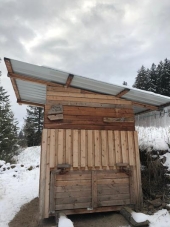




Keep trying new things! The pioneer in us, keeps popping out. Sometimes it stays a little longer out.... and I feel lucky!




Seed the Mind, Harvest Ideas.
http://farmwhisperer.com




Adventures in Gardening! http://backyardgirlie.weebly.com/index.html | Live Happy and Prosper |









Keep trying new things! The pioneer in us, keeps popping out. Sometimes it stays a little longer out.... and I feel lucky!








The ultimate goal of farming is not the growing of crops, but the cultivation and perfection of human beings. - Masanobu Fukuoka








.









 1
1














Keep trying new things! The pioneer in us, keeps popping out. Sometimes it stays a little longer out.... and I feel lucky!
















Iterations are fine, we don't have to be perfect
My 2nd Location:Florida HardinessZone:10 AHS:10 GDD:8500 Rainfall:2in/mth winter, 8in/mth summer, Soil:Sand pH8 Flat










Sam Boisseau wrote:I personally wouldn't add salt to my soil. However I do add sea weed and haven't really been worried about the salt content.
Cho Global Natural Farming recommends seawater diluted 30 times, applied 20-30 days before fruit harvest. Supposedly makes fruits sweeter. I did it sparingly a couple times and hell didn't break loose.
http://ilcasia.files.wordpress.com/2012/02/chos-global-natural-farming-sarra.pdf - page 69
Iterations are fine, we don't have to be perfect
My 2nd Location:Florida HardinessZone:10 AHS:10 GDD:8500 Rainfall:2in/mth winter, 8in/mth summer, Soil:Sand pH8 Flat
 2
2





 4
4




How Permies works: https://permies.com/wiki/34193/permies-works-links-threads
My projects on Skye: The tree field, Growing and landracing, perennial polycultures, "Don't dream it - be it! "
 5
5




'What we do now echoes in eternity.' Marcus Aurelius
How Permies Works Dr. Redhawk's Epic Soil Series
 5
5




Invasive plants are Earth's way of insisting we notice her medicines. Stephen Herrod Buhner
Everyone learns what works by learning what doesn't work. Stephen Herrod Buhner
 6
6




Moderator, Treatment Free Beekeepers group on Facebook.
https://www.facebook.com/groups/treatmentfreebeekeepers/






|
The only cure for that is hours of television radiation. And this tiny ad:
2024 Permaculture Adventure Bundle
https://permies.com/w/bundle
|






